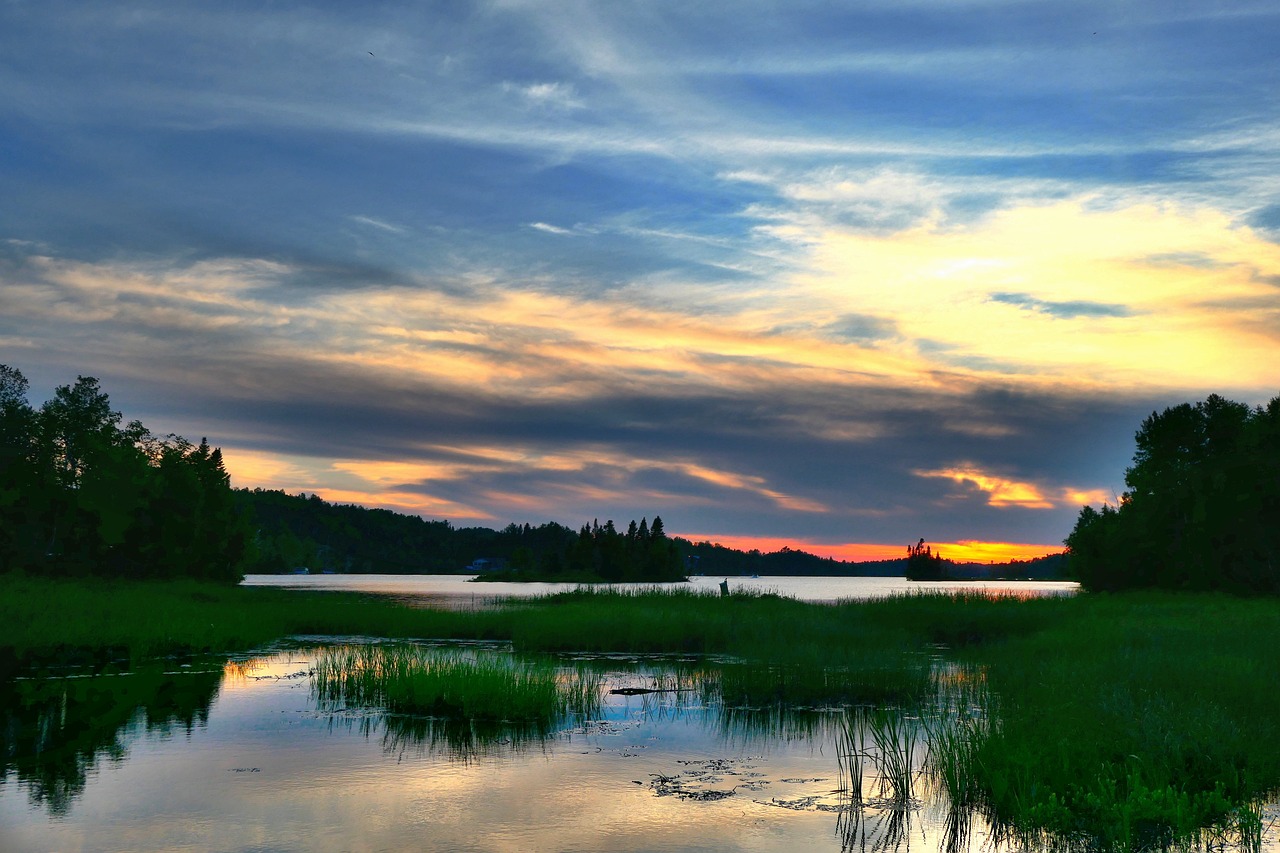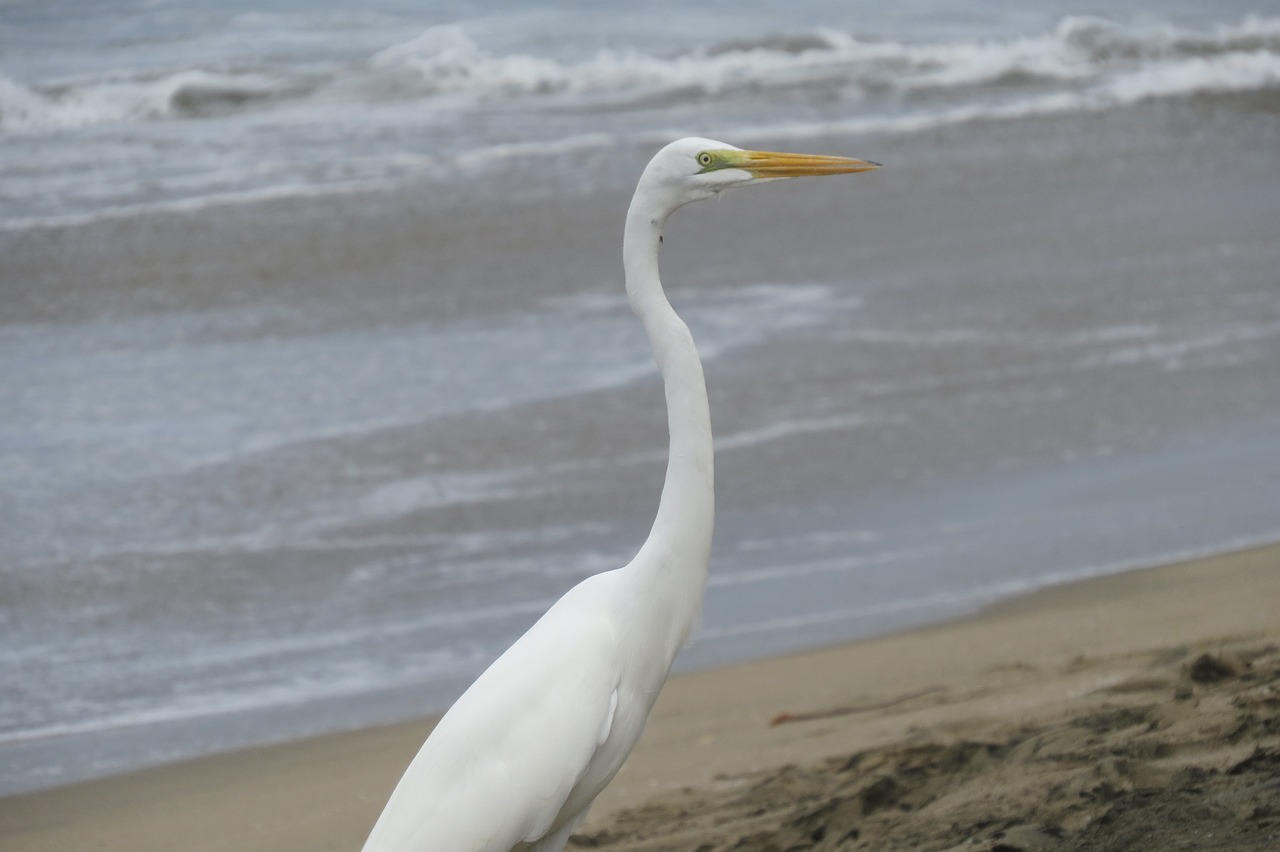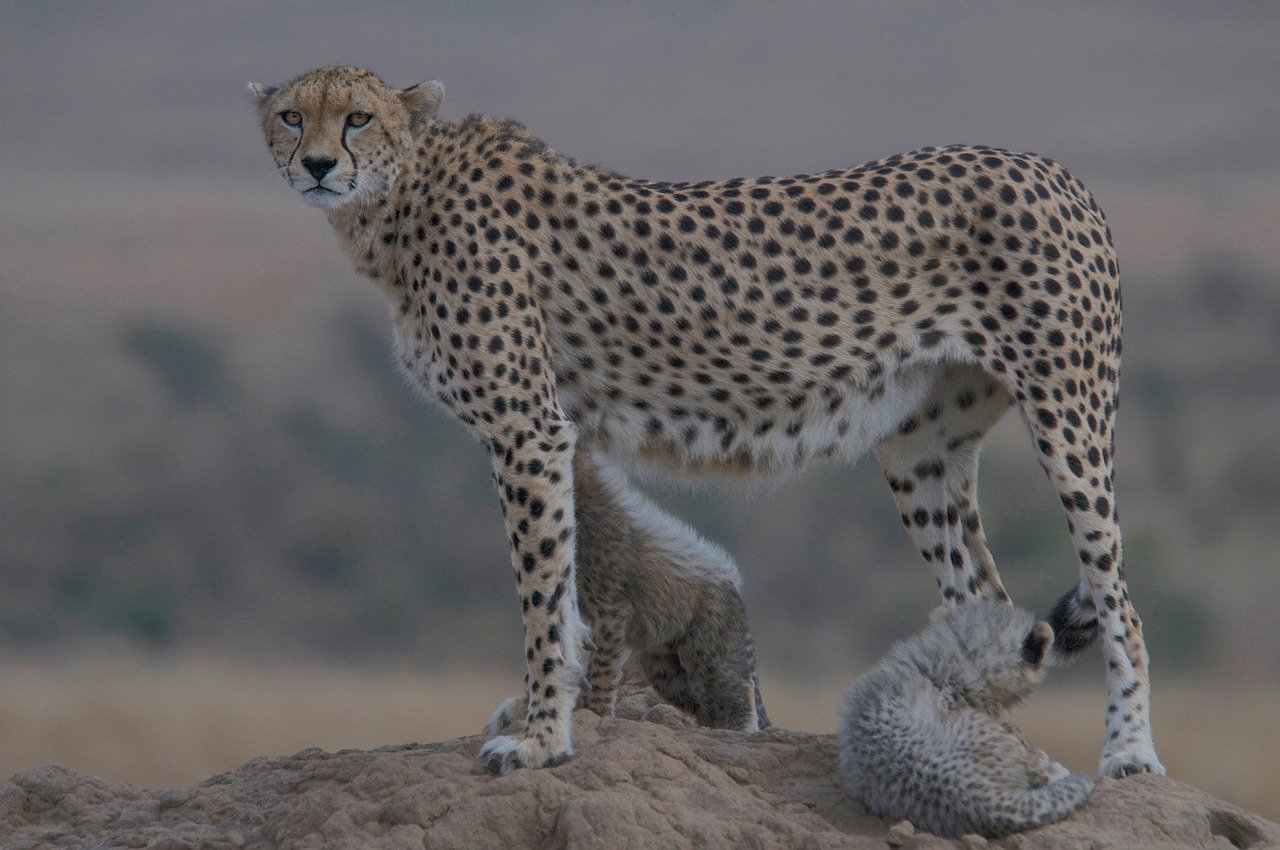Biodiversity and Ecotourism: Friends or Foes?
In today's world, the term biodiversity often pops up in conversations about environmental conservation and sustainability. But what does it really mean? And how does it relate to the booming industry of ecotourism? This article dives into the intricate relationship between these two concepts, exploring whether they can truly coexist or if they are destined to clash. Think of biodiversity as the rich tapestry of life on Earth, woven from countless threads of different species, ecosystems, and genetic variations. Each thread plays a vital role in maintaining the balance of our planet's health. On the other hand, ecotourism is like a double-edged sword; it has the potential to promote conservation and provide economic benefits, but it can also lead to unintended consequences that threaten the very biodiversity it seeks to protect. So, are these two allies in the fight for ecological sustainability, or are they at odds with one another? Let's take a closer look.
Biodiversity refers to the variety of life forms on our planet, encompassing not only the different species of plants and animals but also the ecosystems they inhabit and the genetic diversity within those species. This rich variety is essential for the stability of ecosystems, which in turn supports human life. Imagine a vibrant coral reef teeming with colorful fish, or a lush rainforest filled with diverse flora and fauna. These ecosystems are not just beautiful; they are vital for processes like pollination, nutrient cycling, and climate regulation. When we lose biodiversity, we risk destabilizing these essential services, which can lead to dire consequences for both nature and humanity. Understanding biodiversity is crucial for appreciating its role in ecological balance and human well-being. It’s the foundation upon which our survival rests!
In recent years, a new trend has emerged in the travel industry—ecotourism. This sustainable travel alternative promotes environmental conservation while providing economic benefits to local communities. But what exactly does ecotourism entail? At its core, ecotourism focuses on responsible travel to natural areas, aiming to minimize the ecological footprint of tourists. It's about immersing oneself in nature, learning about local ecosystems, and supporting conservation efforts. Think of it as a way to experience the wonders of the world without leaving a negative mark on it. As more travelers seek authentic experiences, ecotourism has gained popularity, creating a unique opportunity to protect our planet while enjoying its beauty.
Ecotourism can provide significant financial support for conservation efforts and local economies. By attracting tourists to natural areas, it fosters awareness about environmental issues and encourages responsible travel. For instance, when visitors pay for guided tours in a national park, their fees often go directly toward conservation projects. This not only helps preserve the environment but also creates jobs and boosts local economies. It's a win-win situation! Moreover, ecotourism promotes a deeper connection between travelers and nature, inspiring them to become advocates for conservation in their own communities.
The economic impact of ecotourism can be profound, creating jobs and generating income for local communities. Consider this: when a small village near a national park develops eco-lodges and offers guided tours, it opens up new job opportunities for residents, from hospitality to wildlife guiding. This influx of income can significantly improve the quality of life for locals. Case studies from around the world highlight successful ecotourism initiatives that have transformed communities. For example, in Costa Rica, ecotourism has become a cornerstone of the economy, contributing millions of dollars to conservation efforts while providing sustainable livelihoods for thousands. The financial benefits are clear, but the social impact is just as important.
Engaging local communities in ecotourism projects ensures that they benefit directly from conservation efforts. When locals are involved, they become stewards of their environment, taking pride in protecting their natural resources. Strategies for involving residents include offering training programs in hospitality and guiding, establishing community-run eco-lodges, and ensuring a portion of tourism revenue goes back to local projects. By empowering communities, ecotourism not only enhances conservation efforts but also fosters a sense of ownership and responsibility towards the environment.
Despite its benefits, ecotourism can also pose challenges to biodiversity. This section analyzes potential negative impacts, such as habitat destruction and the commercialization of natural resources. For instance, increased foot traffic in sensitive areas can lead to soil erosion and damage to delicate ecosystems. Moreover, as demand for ecotourism grows, there’s a risk of over-commercialization, where the natural beauty is overshadowed by tourist facilities and amenities. It’s essential to strike a balance to ensure that the very essence of ecotourism—conservation and appreciation of nature—is not compromised.
Finding a balance between conservation efforts and tourism development is essential. It’s like walking a tightrope; one misstep could jeopardize the delicate ecosystems we aim to protect. Effective regulatory frameworks are necessary to manage ecotourism sustainably. Policies and guidelines can help mitigate negative impacts on biodiversity while promoting responsible tourism. For example, implementing visitor limits in sensitive areas and conducting environmental impact assessments before new projects can help preserve natural habitats. Additionally, educating tourists about biodiversity and conservation is vital for fostering responsible behavior. Educational programs can promote sustainable practices among travelers, ensuring they leave with a greater appreciation for the environment.
Effective regulatory frameworks are necessary to manage ecotourism sustainably. This section outlines policies and guidelines that can help mitigate negative impacts on biodiversity while promoting responsible tourism. Governments and organizations must work together to create regulations that protect natural areas while allowing for sustainable tourism development. By establishing clear guidelines, we can ensure that ecotourism remains a force for good, rather than a threat to the very ecosystems we cherish.
Educating tourists about biodiversity and conservation is vital for fostering responsible behavior. This section discusses the role of educational programs in promoting sustainable practices among travelers. When tourists understand the importance of biodiversity and the impact of their actions, they are more likely to engage in eco-friendly practices. Imagine a traveler who, after learning about the fragility of a coral reef, decides to snorkel responsibly, avoiding contact with the reef and using reef-safe sunscreen. This kind of awareness can make a world of difference in protecting our planet.
- What is biodiversity? Biodiversity refers to the variety of life on Earth, including different species, ecosystems, and genetic diversity.
- How does ecotourism benefit local communities? Ecotourism creates jobs, generates income, and supports conservation efforts, leading to improved quality of life for local residents.
- What challenges does ecotourism pose to biodiversity? Challenges include habitat destruction, over-commercialization, and increased foot traffic in sensitive areas.
- How can we balance conservation and tourism? By implementing effective regulatory frameworks and promoting education and awareness among tourists.

Understanding Biodiversity
Biodiversity refers to the incredible variety of life on our planet. It encompasses everything from the tiniest microorganisms to the largest mammals, as well as the ecosystems they inhabit. Imagine a vibrant tapestry, each thread representing a different species, all woven together to create a complex and interdependent web of life. This diversity is not just beautiful; it plays a crucial role in maintaining ecological balance and ensuring the health of our planet.
At its core, biodiversity can be broken down into three main components:
- Ecosystem Diversity: This involves the variety of ecosystems, such as forests, wetlands, grasslands, and oceans. Each ecosystem supports different organisms and contributes uniquely to the planet's overall health.
- Species Diversity: This refers to the variety of species within an ecosystem. Each species has a specific role, whether it be as a predator, prey, or pollinator, and contributes to the overall functionality of the ecosystem.
- Genetic Diversity: This is the variation in genetic makeup within a species. Higher genetic diversity allows species to adapt to changing environments and resist diseases, making it essential for survival.
Understanding the importance of biodiversity is crucial for appreciating how it affects not only ecological balance but also human well-being. Healthy ecosystems provide us with essential services, such as clean air, fresh water, food, and even climate regulation. For instance, forests act as carbon sinks, absorbing CO2 and helping to mitigate climate change. Similarly, wetlands filter pollutants and provide habitat for countless species, including those vital for fishing and agriculture.
However, biodiversity is under threat. Human activities such as deforestation, pollution, and climate change are driving species to extinction at an alarming rate. According to the World Wildlife Fund, we have lost over half of the world’s wildlife in the last 40 years. This alarming statistic highlights the urgent need for conservation efforts. Protecting biodiversity is not just about saving the animals and plants we love; it’s about preserving the intricate systems that sustain life on Earth.
In conclusion, understanding biodiversity is like unlocking the secrets of life itself. It's a reminder that every species, no matter how small, plays a vital role in the grand scheme of things. As stewards of this planet, we must recognize our responsibility to protect it. By promoting awareness and taking action, we can ensure that future generations inherit a world rich in biodiversity.

The Rise of Ecotourism
In recent years, ecotourism has emerged as a beacon of hope for travelers who want to explore the beauty of our planet without leaving a negative mark on it. Unlike traditional tourism, which often prioritizes profit over preservation, ecotourism emphasizes sustainability and conservation. This shift in focus is not just a passing trend; it's a response to the growing awareness of the environmental challenges we face today. Many travelers are now seeking experiences that allow them to connect with nature, support local communities, and contribute to the preservation of biodiversity.
At its core, ecotourism is about responsible travel. It encourages visitors to immerse themselves in the natural world while minimizing their ecological footprint. This means choosing destinations that prioritize environmental stewardship and engaging in activities that are sustainable and respectful of local cultures. Whether it's hiking through a rainforest, snorkeling in coral reefs, or participating in wildlife conservation projects, ecotourism offers a unique way to experience the wonders of nature.
One of the key principles of ecotourism is that it should provide economic benefits to local communities. By promoting local businesses and creating job opportunities, ecotourism can help alleviate poverty while fostering a sense of pride and ownership among residents. For instance, local guides can offer authentic experiences that highlight their culture and environment, allowing tourists to gain a deeper understanding of the places they visit. This not only enriches the travel experience but also ensures that the economic advantages of tourism are shared with those who live in these beautiful areas.
However, it's essential to recognize that not all forms of tourism labeled as "ecotourism" genuinely adhere to its principles. Some operators may exploit the term without implementing sustainable practices, leading to environmental degradation and cultural disruption. Therefore, travelers must be discerning when choosing their ecotourism experiences. Look for operators who are certified by recognized organizations and those who actively engage in conservation efforts. This way, you can ensure that your travel choices contribute positively to the environment and local communities.
As the demand for ecotourism grows, so does the need for effective management and regulation. Governments and organizations must work together to create policies that promote sustainable practices while protecting fragile ecosystems. Education plays a crucial role in this process, as it helps both tourists and local communities understand the importance of biodiversity and the need for conservation. By fostering a culture of respect and responsibility, we can ensure that ecotourism becomes a powerful tool for environmental protection rather than a threat to it.
In summary, the rise of ecotourism represents a significant shift in how we approach travel. It offers an opportunity to connect with nature, support local communities, and contribute to the preservation of our planet's rich biodiversity. As travelers, we have the power to make choices that align with these values, paving the way for a more sustainable future for all.

Benefits of Ecotourism
Ecotourism is not just a buzzword; it represents a significant shift in how we approach travel and conservation. Imagine stepping into a lush rainforest, surrounded by vibrant wildlife, and knowing that your visit is helping to protect that very environment. That's the essence of ecotourism! It serves as a bridge connecting travelers to nature, while simultaneously providing vital support to conservation efforts and local economies.
One of the most compelling is its ability to generate substantial financial resources for conservation initiatives. When tourists flock to a destination, they bring their wallets with them, and this influx of cash can be directed toward protecting endangered species and preserving fragile ecosystems. For instance, a portion of the fees collected from guided tours can be reinvested into local conservation programs. This creates a positive feedback loop where both the environment and the economy thrive.
Moreover, ecotourism fosters a heightened awareness of environmental issues among travelers. When people experience the beauty of a natural habitat firsthand, they often return home with a newfound appreciation and a desire to advocate for its protection. This ripple effect can lead to increased support for environmental policies and initiatives globally. As tourists share their experiences, they inspire others to consider the impact of their travel choices, promoting a culture of responsible tourism.
Another significant aspect is the empowerment of local communities. By engaging residents in ecotourism projects, we ensure that they reap the benefits of conservation efforts. Local guides, artisans, and hospitality providers can all find sustainable livelihoods through ecotourism. This not only helps to alleviate poverty but also fosters a sense of pride and stewardship over their natural resources. Communities that feel invested in their environment are more likely to take active roles in its preservation.
To illustrate the economic impact of ecotourism, let's take a look at a few successful case studies:
| Location | Ecotourism Initiative | Economic Impact |
|---|---|---|
| Galapagos Islands, Ecuador | Conservation fees for visitors | Funding for wildlife protection and local jobs |
| Masai Mara, Kenya | Community-run safari lodges | Income for local tribes and wildlife conservation |
| Costa Rica | National park entrance fees | Investment in biodiversity and habitat restoration |
In summary, the benefits of ecotourism extend far beyond just the traveler’s experience. It plays a crucial role in conservation funding, raises awareness about environmental issues, and empowers local communities. The next time you consider your travel plans, think about how your journey can contribute to the greater good. After all, every step you take in nature can lead to a more sustainable future.
- What is ecotourism? Ecotourism is a form of sustainable travel that focuses on visiting natural areas while promoting conservation and benefiting local communities.
- How does ecotourism benefit local economies? By attracting tourists, ecotourism creates jobs and generates income for local businesses, helping to support community development.
- Can ecotourism harm the environment? While ecotourism aims to minimize ecological footprints, it can lead to habitat destruction if not managed properly. Sustainable practices are essential.
- How can I participate in ecotourism? Choose eco-friendly travel options, support local businesses, and engage in responsible travel practices that prioritize conservation.

Economic Impact
The economic impact of ecotourism is profound, acting as a lifeline for many communities around the globe. By focusing on sustainability, ecotourism creates jobs, stimulates local economies, and often leads to the preservation of natural resources. Imagine a small village nestled in the heart of a rainforest. For years, its residents relied on logging for income, which slowly eroded their environment. However, with the rise of ecotourism, they shifted their focus to welcoming visitors who want to experience the beauty of their surroundings. This transition not only protects the forest but also provides a steady income stream for the locals.
To illustrate this impact, consider the following table, which showcases the economic benefits of ecotourism in various regions:
| Region | Ecotourism Revenue (Annual) | Jobs Created | Conservation Funding |
|---|---|---|---|
| Amazon Rainforest | $250 million | 15,000 | $50 million |
| Galapagos Islands | $100 million | 5,000 | $20 million |
| Kenya | $300 million | 20,000 | $70 million |
This table highlights just a few examples of how ecotourism can generate substantial revenue while simultaneously creating job opportunities. In regions like the Amazon, where biodiversity is at risk, the shift towards ecotourism has not only provided economic relief but has also fostered a sense of stewardship among the locals. When people see the direct financial benefits of preserving their environment, they become more invested in conservation efforts.
Moreover, ecotourism encourages the development of local businesses. From guiding services to handicrafts, local entrepreneurs can thrive in an ecotourism economy. Visitors often seek authentic experiences, which means that local artisans and service providers can showcase their skills and products. This not only enhances the visitor experience but also ensures that the economic benefits remain within the community.
However, it’s important to note that the success of ecotourism relies heavily on responsible management. Without proper oversight, the influx of tourists can lead to unintended consequences, such as overcrowding or environmental degradation. Thus, maintaining a delicate balance is crucial. By implementing sustainable practices and engaging the community, the economic impact of ecotourism can be maximized while minimizing its footprint on the environment.
In conclusion, the economic benefits of ecotourism are significant and multifaceted. It not only provides financial support to local communities but also fosters a culture of conservation. By embracing ecotourism, we can create a sustainable future where both people and nature thrive together.
- What is ecotourism? Ecotourism is a responsible travel approach that focuses on visiting natural areas to conserve the environment and improve the well-being of local communities.
- How does ecotourism benefit local economies? It generates income through tourism, creates jobs, and encourages the sustainable use of local resources.
- Can ecotourism harm biodiversity? Yes, if not managed properly, it can lead to habitat destruction and other negative impacts. Sustainable practices are essential to mitigate these risks.
- What role do local communities play in ecotourism? Local communities are crucial for the success of ecotourism, as their involvement ensures that they benefit from conservation efforts and that their cultural heritage is respected.

Community Involvement
Community involvement in ecotourism is not just a buzzword; it’s a vital lifeline for both local populations and the ecosystems they inhabit. When local communities are actively engaged in ecotourism projects, they become stewards of their environment, fostering a sense of ownership and responsibility that is crucial for sustainable development. Imagine a small village nestled near a lush rainforest. When the villagers participate in ecotourism, they don’t just earn a living; they also protect their home. This synergy can lead to a thriving ecosystem and a flourishing community.
One of the most effective ways to ensure community involvement is through collaborative decision-making. When local voices are heard in the planning stages of ecotourism initiatives, the outcomes are often more beneficial. This collaboration can take many forms, including:
- Workshops and Training: Providing locals with training on sustainable practices equips them with the skills needed to engage in ecotourism effectively.
- Local Leadership: Encouraging community members to take on leadership roles in ecotourism projects helps to foster a sense of pride and responsibility.
- Profit Sharing: Ensuring that a portion of the profits from ecotourism ventures goes back to the community can motivate residents to protect their natural resources.
Additionally, involving communities in the development of ecotourism helps to preserve cultural heritage. Tourists are often eager to learn about local traditions, crafts, and ways of life, which can be showcased through guided tours or cultural events. This not only enhances the visitor experience but also empowers the community to share its unique identity. For instance, a village might offer workshops on traditional weaving or cooking classes featuring local cuisine. Such initiatives create a win-win situation: tourists gain authentic experiences, while locals benefit economically.
However, it's essential to approach community involvement with sensitivity and respect. Not all community members may agree on how to engage with ecotourism, and it's crucial to navigate these dynamics carefully. Open dialogues and ongoing communication can help to address concerns and ensure that everyone feels included in the decision-making process. In this way, ecotourism can transform from a mere economic opportunity into a holistic approach that benefits both biodiversity and local communities.
In conclusion, community involvement is the backbone of successful ecotourism initiatives. By fostering a collaborative environment and respecting local cultures, we can create a sustainable model that not only protects our planet but also uplifts the very people who call it home. After all, when communities thrive, so does biodiversity.
Q1: How can communities get involved in ecotourism?
A1: Communities can get involved through workshops, training programs, and by taking leadership roles in ecotourism projects. Engaging in profit-sharing agreements can also incentivize local participation.
Q2: What are the benefits of community involvement in ecotourism?
A2: Community involvement leads to better conservation efforts, economic benefits, preservation of cultural heritage, and a stronger sense of ownership among local residents.
Q3: How can we ensure that ecotourism is sustainable?
A3: Sustainable ecotourism can be ensured through effective regulatory frameworks, community engagement, and educational programs that promote responsible travel practices.

Challenges of Ecotourism
While ecotourism is often hailed as a beacon of hope for sustainable travel, it comes with its own set of challenges that can jeopardize the very biodiversity it aims to protect. One of the most pressing issues is habitat destruction. As more tourists flock to pristine areas, the infrastructure required to support them—such as hotels, roads, and other amenities—can lead to significant alterations in the landscape. This not only disrupts local wildlife but can also lead to the fragmentation of ecosystems, making it harder for species to thrive.
Another challenge is the commercialization of natural resources. In the quest to attract visitors, some ecotourism ventures may prioritize profit over preservation. This can result in the overexploitation of resources, such as wildlife and plants, which are often marketed as unique attractions. For instance, the demand for wildlife encounters can lead to unethical practices, such as keeping animals in captivity or promoting activities that are harmful to their natural behaviors.
Furthermore, there is the issue of cultural erosion. As local communities become increasingly involved in ecotourism, there can be a shift in traditional practices and values. The influx of tourists may lead to a commodification of culture, where local customs are altered or staged to meet tourist expectations. This not only diminishes the authenticity of cultural experiences but can also create tension between locals and visitors.
Lastly, there is the potential for environmental degradation due to increased foot traffic. Popular ecotourism sites can suffer from soil erosion, pollution, and littering, which can have long-lasting effects on the environment. Tourists may unintentionally trample delicate ecosystems or leave behind waste that harms wildlife.
To illustrate these challenges, consider the following table that summarizes some of the key issues associated with ecotourism:
| Challenge | Description |
|---|---|
| Habitat Destruction | Infrastructure development can fragment ecosystems and disrupt wildlife habitats. |
| Commercialization | Profit-driven motives can lead to overexploitation of natural resources. |
| Cultural Erosion | Local traditions may be altered to cater to tourist expectations, losing authenticity. |
| Environmental Degradation | Increased foot traffic can result in soil erosion, pollution, and habitat damage. |
In conclusion, while ecotourism has the potential to be a force for good, it is crucial to acknowledge and address these challenges. By doing so, we can work towards a model of ecotourism that truly supports biodiversity and promotes sustainable practices.
- What is ecotourism? Ecotourism is a responsible travel approach that focuses on visiting natural areas while conserving the environment and improving the well-being of local communities.
- How can ecotourism harm biodiversity? Ecotourism can lead to habitat destruction, overexploitation of resources, and environmental degradation, which can negatively impact local ecosystems.
- What measures can be taken to mitigate the challenges of ecotourism? Implementing effective regulations, promoting sustainable practices, and educating tourists about responsible behavior can help minimize negative impacts.
- Can ecotourism benefit local communities? Yes, ecotourism can provide economic benefits and create jobs for local communities, encouraging them to participate in conservation efforts.

Balancing Conservation and Tourism
Finding a harmonious balance between conservation and tourism is not just a noble goal; it's an absolute necessity in today's world. As the demand for travel increases, so does the pressure on our planet's precious ecosystems. Can we really enjoy the beauty of nature while ensuring it remains intact for future generations? The answer lies in sustainable practices that prioritize the well-being of both the environment and local communities.
To achieve this balance, various strategies can be implemented. First and foremost, effective regulatory frameworks are vital. These frameworks should include policies that regulate the number of visitors to sensitive areas, ensuring that tourism does not overwhelm the local environment. For instance, national parks can establish visitor caps during peak seasons to minimize human impact. Furthermore, environmental impact assessments should be mandatory for new tourism projects, allowing stakeholders to understand potential consequences before moving forward.
Moreover, community involvement plays a crucial role in sustainable tourism. When local residents are actively engaged in ecotourism initiatives, they are more likely to support conservation efforts. This can be achieved through training programs that educate locals about sustainable practices, enabling them to become stewards of their environment. For example, a community-led project that focuses on preserving local wildlife can create jobs while simultaneously protecting biodiversity. By fostering a sense of ownership, communities can thrive economically without sacrificing their natural heritage.
Education and awareness also cannot be overlooked. Tourists should be informed about the ecological significance of the areas they visit. This can be accomplished through educational programs that highlight local biodiversity, conservation challenges, and the cultural importance of the environment. Imagine a guided tour where visitors not only marvel at stunning landscapes but also learn about the intricate web of life that sustains these ecosystems. This kind of immersive experience can transform tourists into advocates for conservation, encouraging them to adopt responsible practices during their travels.
To illustrate the importance of balancing tourism with conservation, consider the following table showcasing some successful ecotourism initiatives around the globe:
| Location | Ecotourism Initiative | Impact on Conservation |
|---|---|---|
| Galapagos Islands | Controlled Visitor Access | Protected species and habitats |
| Costa Rica | Community-Based Tourism | Increased funding for local conservation projects |
| Kenya | Wildlife Conservancies | Reduced poaching and habitat destruction |
Ultimately, the key to balancing conservation and tourism lies in collaboration. Stakeholders, including governments, NGOs, local communities, and tourists themselves, must work together to create a sustainable model that benefits everyone. By implementing thoughtful regulations, fostering community engagement, and promoting education, we can ensure that ecotourism serves as a powerful tool for conservation rather than a threat to it. So, the next time you plan a trip, remember: your choices matter. By being a responsible traveler, you can contribute to the preservation of our planet's biodiversity, ensuring that future generations can experience the wonders of nature just as we do today.
- What is ecotourism? Ecotourism is a responsible travel approach that focuses on visiting natural areas while promoting conservation and minimizing environmental impact.
- How can I be a responsible ecotourist? You can be responsible by respecting local cultures, supporting local economies, and following guidelines to protect the environment.
- What are the benefits of ecotourism? Ecotourism can provide economic benefits to local communities, raise awareness about environmental issues, and support conservation efforts.
- Can ecotourism harm the environment? Yes, if not managed properly, ecotourism can lead to habitat destruction, pollution, and the commercialization of natural resources.

Regulatory Frameworks
In the intricate dance between ecotourism and biodiversity, play a pivotal role in ensuring that both can thrive without stepping on each other's toes. Think of these frameworks as the rules of a game; without them, chaos can ensue. Effective regulations help manage the delicate balance between encouraging tourism and protecting the natural environments that draw visitors in the first place. They provide guidelines that dictate how ecotourism should be conducted, ensuring that the beauty of our planet is preserved for future generations.
One of the primary goals of these frameworks is to minimize the ecological footprint of tourism activities. This means implementing policies that limit the number of visitors to sensitive areas, regulate the types of activities allowed, and establish guidelines for waste management. For instance, many national parks have set visitor caps during peak seasons to prevent overcrowding, which can lead to soil erosion, habitat destruction, and the disruption of local wildlife. By controlling the flow of tourists, these regulations help maintain the integrity of ecosystems.
Moreover, regulatory frameworks often include strict environmental assessments before any ecotourism project is approved. These assessments evaluate the potential impact of proposed activities on local biodiversity and ecosystems. They serve as a crucial checkpoint to ensure that projects align with conservation goals. For example, a new lodge built near a protected area must demonstrate that it will not harm endangered species or disrupt fragile habitats. Such rigorous evaluations help in making informed decisions that prioritize ecological health.
Another essential component of regulatory frameworks is the involvement of local communities. Effective regulations should not only focus on conservation but also empower local residents. This means including them in the decision-making processes and ensuring they benefit from ecotourism initiatives. When local communities are engaged, they become stewards of their environment, advocating for practices that protect their natural resources. Additionally, regulations can mandate that a portion of ecotourism revenues be reinvested into community development and conservation projects, creating a win-win situation for both tourists and locals.
To illustrate the effectiveness of regulatory frameworks, consider the case of Costa Rica, a pioneer in ecotourism. The country has developed comprehensive policies that govern tourism activities, including strict guidelines on wildlife interactions and habitat preservation. These regulations have not only protected its rich biodiversity but have also positioned Costa Rica as a leading destination for eco-conscious travelers. The success of such frameworks demonstrates that with the right policies in place, ecotourism can flourish while safeguarding the environment.
In summary, the role of regulatory frameworks in balancing ecotourism and biodiversity cannot be overstated. They are essential for managing the impacts of tourism, engaging local communities, and ensuring that conservation efforts are prioritized. As we move forward, it is crucial that policymakers continue to adapt and strengthen these frameworks to meet the evolving challenges of ecotourism, ensuring that our planet's precious biodiversity remains intact.
- What is the primary purpose of regulatory frameworks in ecotourism?
They aim to manage the balance between tourism and biodiversity, ensuring that both can coexist sustainably. - How do regulatory frameworks benefit local communities?
They empower local residents by involving them in decision-making processes and ensuring they receive economic benefits from ecotourism. - Can you give an example of a successful regulatory framework?
Costa Rica has implemented comprehensive policies that protect biodiversity while promoting ecotourism, making it a model for other countries.

Education and Awareness
When it comes to fostering a culture of responsible tourism, education and awareness play pivotal roles. Imagine stepping into a lush rainforest, the air thick with the scent of damp earth and the sounds of exotic wildlife surrounding you. Now, picture if every visitor understood the delicate balance that sustains this vibrant ecosystem. This is where education steps in, acting as a bridge between tourists and the natural world. By enlightening travelers about the importance of biodiversity and the impact of their actions, we can cultivate a sense of stewardship that encourages them to protect rather than exploit.
One effective method of promoting awareness is through educational programs that are integrated into the ecotourism experience. These programs can range from guided tours led by knowledgeable local experts to interactive workshops that engage visitors in conservation efforts. For instance, a tour guide might share fascinating insights about the flora and fauna, explaining how each species contributes to the ecosystem's health. This not only enriches the visitor's experience but also instills a deeper appreciation for the environment.
Moreover, educational initiatives can be tailored to different audiences. For families, engaging activities like scavenger hunts or wildlife observation can make learning fun and interactive. For adults, workshops on sustainable practices or lectures about local conservation efforts can provide valuable insights. The goal is to create an environment where learning is not just encouraged but celebrated, transforming tourists into informed advocates for the places they visit.
In addition to on-site education, digital platforms are becoming increasingly important in spreading awareness. Social media campaigns, informative blogs, and interactive websites can reach a broader audience, sparking interest in ecotourism and biodiversity. For example, a well-crafted video showcasing the beauty of a national park and the threats it faces can motivate viewers to participate in conservation efforts or choose ecotourism over traditional tourism.
To summarize, education and awareness are the cornerstones of sustainable ecotourism. By equipping travelers with knowledge about biodiversity and conservation, we empower them to make informed choices that positively impact the environment. As we continue to navigate the complexities of tourism and conservation, let’s remember that every informed traveler is a potential guardian of our planet's precious ecosystems.
- What is ecotourism? Ecotourism is responsible travel to natural areas that conserves the environment and improves the well-being of local people.
- How does education contribute to ecotourism? Education raises awareness about biodiversity and conservation, encouraging responsible behavior among tourists.
- What are some effective educational strategies in ecotourism? Strategies include guided tours, workshops, and digital campaigns that inform and engage visitors.
- Why is community involvement important in ecotourism? Involving local communities ensures they benefit from tourism and are motivated to protect their natural resources.
Frequently Asked Questions
- What is biodiversity and why is it important?
Biodiversity refers to the variety of life on Earth, including different ecosystems, species, and genetic variations. It's crucial because it helps maintain ecological balance, supports food webs, and provides resources for human survival, such as clean air, water, and medicine.
- How does ecotourism benefit local communities?
Ecotourism can significantly boost local economies by creating jobs and generating income through tourism activities. When communities are involved in ecotourism, they gain financial incentives to preserve their natural resources, which fosters a sustainable relationship between people and the environment.
- What are the potential drawbacks of ecotourism?
While ecotourism aims to promote conservation, it can sometimes lead to habitat destruction, overcrowding, and the commercialization of natural resources. If not managed properly, it can undermine the very biodiversity it seeks to protect.
- How can we balance conservation with tourism development?
Balancing conservation and tourism involves implementing effective regulatory frameworks that set guidelines for sustainable practices. This includes limiting visitor numbers, educating tourists, and ensuring that local communities are directly involved in ecotourism initiatives.
- What role does education play in ecotourism?
Education is vital in ecotourism as it helps raise awareness about biodiversity and conservation. By informing tourists about the ecological significance of the areas they visit, they are more likely to engage in responsible behaviors that support sustainability.
- Can ecotourism truly support biodiversity?
Yes, when done correctly, ecotourism can support biodiversity by funding conservation projects, promoting awareness, and encouraging responsible travel. It creates a financial incentive for protecting natural habitats, which can lead to healthier ecosystems.



















